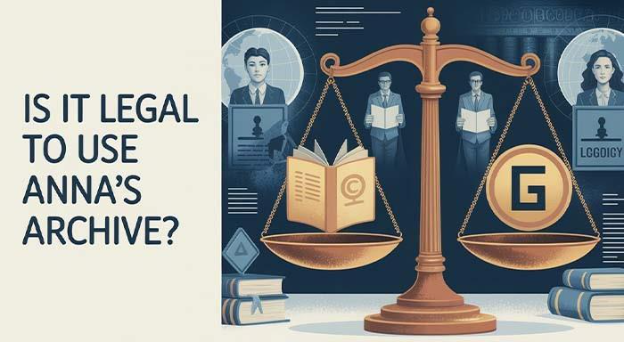In an increasingly interconnected world, access to knowledge repositories and research materials is no longer a luxury but a right. Millions of researchers, learners, and curious individuals across the globe are denied access to information because of paywalls, geo limiting, and economic reasons. This digital divide has led to an international debate about the democratization of knowledge and the contribution of open access websites.
The presence of platforms like Sci-Hub and Z-Library was a significant turning point in the availability of books and scholarly materials for the masses. The "shadow libraries" became massively popular in providing free access to millions of books despite the fact that the operations remained largely in a state of legal uncertainty. When Z-Library was subject to takedown attempts in 2022, it created a huge void in the open knowledge system.
Step into Annas Archive – a new player that has come on the scene as a one-stop solution for people looking for open access to books and research documents. The site is not only a substitute for what was lost, but also perhaps a new model in how we approach preserving and gaining access to human knowledge.
What Is Annas Archive?
Anna's Archive is an open-source shadow library search engine. It was initiated by pseudonymous Anna in the immediate aftermath of law enforcement attempts to close down Z-Library in 2022. In contrast with physical libraries or indeed other shadow libraries, Anna's Archive functions as an advanced meta-search engine that harvests content from multiple sources without actually hosting the files themselves.
The site presents itself as "The world's largest open-source open-data library" reflecting and consolidating content from other current shadow libraries such as Sci-Hub, Library Genesis (LibGen), and the previous Z-Library collection. Such a model provides users with a single portal while distributing technical and legal risk across several sites.
What is unique about Annas Archive is its dedication to openness and open-source values. The project is a non-profit venture with a defined mission: to ensure access to human knowledge and make it accessible to everyone, anywhere. Instead of benefiting from content distribution, the platform is designed to develop a solid foundation for the preservation of and access to knowledge.
The launch timing of Anna's Archive was deliberate. With Z-Library having been taken down, the team quickly set to put this website live to restore the collection of Z-Library for access. This quick intervention proves that the anonymous developers of the project were committed to sustaining open access to learning resources.
What is Available on Anna's Archive?
Anna's Archive is an entry point to a vast repository of digital information in several formats and fields. The exhaustive indexing mechanism of the platform gives access to:
- Books: The archive contains millions of fiction and non-fiction books, from bestsellers of the day to classics. Users can locate textbooks, academic monographs, popular science, and specialized technical manuals. The collection is in many languages and covers almost every possible subject area.
- Scholarly Articles: Research articles, journal publications, conference proceedings, and scholarly journals constitute a major portion of content being indexed. Open access journals and content otherwise behind subscription walls are included, making higher research accessible to a greater number of people.
- Comics and Magazines: The platform goes beyond the traditional scholarly content to include comic books, graphic novels, and magazine archives. The diverse collection caters to different user interests and preserves cultural artifacts that might otherwise be difficult to access.
Historical and Uncommon Digitized Material:
Perhaps, the most value of Anna's Archive lies in material regarding rare books, historic manuscripts, and out-of-print books. Such material is not to be found at times, even in material libraries, but can be accessed by scholars and hobbyists around the world.
The diversity of content available in Anna's Archive reflects the diverse needs of its global readership, ranging from students seeking textbooks to researchers hunting for obscure academic papers, to regular readers seeking their next great read.
How It Works (Without Promoting Piracy)
Understanding Anna's Archive's technical architecture helps clarify its role in the digital library ecosystem. Anna's Archive doesn't host anything on its own. It is, on the other hand, an extremely advanced meta-search engine. It looks at a lot of mirror sites for shadow libraries and makes a list of them.
The site works by correlating metadata from a number of external sources, including well-known shadow libraries such as Sci-Hub and Library Genesis. When users want to access content, Anna's Archive searches its extensive database of correlated materials and offers links to external sites where the original files are actually located.
The technical underpinnings depend on a number of significant technologies:
Distributed Storage Systems: The site leverages BitTorrent protocols and IPFS (Interplanetary File System) to form durable, distributed networks for content storage. These technologies make materials available even if specific servers are taken down.
Mirror Networks: Having connectivity to several mirror sites, Anna's Archive establishes redundancy to guard against single points of failure. Users can normally access the same content when a single source is unavailable by using other mirrors.
Metadata Preservation:
This platform does not save original documents instead of saving extensive metadata. This briefly comprises data, documents and matrix track sources and build
The platform doesn't store real files but instead saves extensive metadata for every item it indexes. This comprises bibliographic data, file types, quality metrics, and tracking of sources – building an exhaustive catalog without storage and bandwidth burdens of keeping the contents themselves.
This decentralized method fulfills several purposes: It decreases the technical load upon any one platform, provides resistance to takedown attempts, and facilitates more effective resource utilization throughout the network.
Is It Legal to Use Anna's Archive?

Anna's Archive and other sites like it, have a controversial legal status that is complex and in a gray area, and it differs dramatically by jurisdiction and usage. What is important to realize is that Anna's Archive itself does not host copyrighted content, but rather, some of the third-party links it is indexing point to copyrighted content.
The legal standing of the platform is complex. As a search engine that crawls metadata as opposed to web hosting, Anna's Archive functions in much the same way as Google does in indexing web pages. The difference arises when the central mission is making available copyrighted content that may not otherwise be legally accessible in some jurisdictions.
Before using the platform, users need to seriously consider a few factors:
Local Laws: Copyright legislation varies widely across countries. What might be allowed in one nation could be against the law in another. The users must research and know their local copyright laws prior to accessing materials from the platform.
Fair Use and Education Exceptions: Legal systems in most places have education and research exceptions, but these exceptions are not free of particular restrictions and requirements. Students and scholars are encouraged to familiarize themselves with such provisions in their jurisdiction.
Ethical Considerations: In practice, users should also consider the ethical consequences of their actions. Contributing authors and publishers by making genuine purchases, as and when possible, helps in sustaining the production of new literature and knowledge.
The users recommendation is straightforward: use Anna's Archive with circumspection and mainly for ethical, educational, or research purposes. Wherever possible, give precedence to legal substitutes and view the platform as a recourse for final instance when content is truly unavailable through legitimate means.
The Bigger Picture: Why It Matters
Anna's Archive represents more than just another way to access books and papers – it embodies a philosophical stance on knowledge, accessibility and preservation. The platform addresses several critical issues in our modern information landscape:
- Endangered Knowledge Preservation: Numerous books, particularly older or specialty titles, risk being lost forever as physical volumes degrade and digital rights become entangled. Anna's Archive is a digital preservation project that safeguards human knowledge from being lost to time, disuse, or corporate whim.
- Aiding Global Education: Students and researchers in the developing world often have limited access to high-priced academic content. It may cost more than a month's pay for one textbook in some areas, and thus form insurmountable obstacles to education. Sites such as Anna's Archive are able to level the playing field, granting equal access to educational content irrespective of financial situation.
- Fighting Censorship: In a few areas, specific books or research publications will be prohibited or banned on grounds of politics, religion, or culture. Open access websites can be crucial tools in combating censorship and ensuring intellectual freedom as well as keeping varied viewpoints accessible to seekers.
- Challenging Publishing Monopolies: The scholarly publishing market has come under attack for constructing artificial scarcity around publicly funded scholarship. If taxpayers support research through government grants, many feel that the findings should be readily available and not trapped behind costly paywalls.
- Cultural Preservation: Aside from academic material, sites such as Anna's Archive work towards preserving cultural objects, books, and documents of history that could otherwise be lost or inaccessible by virtue of commerciality.
The wider influence of Anna's Archive lies in how we define knowledge in terms of a common human heritage and not as a product to be sold and made proprietary.
Alternatives to Anna's Archive (Safe Options)
For users seeking legal and ethical alternatives to shadow libraries, several legitimate platforms provide extensive access to books, research, and educational materials:
1. Oceanofpdf
There are many alternative websites to Anna's Archive, but Oceanofpdf stands among the best ones. As one of the premier sources of free and accessible knowledge and information to all people around the world. Oceanofpdf has an impressive library of varied genres, magazines and newspapers, web novels, and even translations offered in multiple languages, as well. The majority of user reviews state that Oceanofpdf is a free and safe replacement to Anna's Archive that accepts both the PDF and EPUB formats of files.
2. Internet Archive
The greatest alternative website to Anna's Archive is the veteran Internet Archive. Existing for more than 25 years, Internet Archive has amassed more than 44 million texts and more than 835 billion web pages on its Wayback Machine. This Anna's Archive alternative provides a wide range of file formats such as .txt, .pdf, .epub, and more to download. With an excellent reputation, Internet Archive is free, doesn't pester users with a stream of ads, and all accounts indicate it's extremely safe. If you're searching for a conveniently accessible title from a site like Anna's Archive, Internet Archive is the first place to look.
3. HathiTrust Digital Library
HathiTrust Digital library is a massive collaborative repository of digital content from research libraries. Its collections contain content digitized through Google Books and the Internet Archive digitization programs, as well as locally digitized content by libraries. HathiTrust was established in October 2008 by the twelve institutions of the Committee on Institutional Cooperation and the eleven libraries of the University of California. As of 2024, membership consists of over 219 research libraries in the United States, Canada, and Europe, and operates on a shared governance model.
4. Project Gutenberg (PG)
For users seeking a completely legal alternative to Anna's Archive, Project Gutenberg stands as one of the most established and reputable options. This volunteer-driven project focuses on digitizing and archiving works of culture while encouraging the creation and distribution of eBooks. Founded in 1971 by US author Michael S. Hart, Project Gutenberg holds the distinction of being the world's oldest digital library, predating the internet as we know it today.
5. Directory of Open Access Journals (DOAJ)
Directory of Open Access lists more than 17,000 peer-reviewed open access journals across all academic subjects. They are freely accessible to read and download, a legitimate alternative to paywalled scholarly content.
These alternatives show that much high-quality educational and research material can be found through legitimate means, although they might not be as wide-ranging in scope as shadow libraries.
Final observations:
Anna's Archive is a major step forward in information sharing in the digital era, manifesting actual demand for open access to educational material while showing the contradiction between the protection of copyrights and making knowledge accessible.
The quick take-up of the platform indicates the critical position shadow libraries occupy in the global knowledge system, especially for accessing scarce materials and facilitating research in resource-poor settings. But users must be careful and use it as a last resort, respecting legal alternatives when they exist and thinking about the greater consequence of their actions.
At the end of the day, Anna's Archive is both a temporary measure and a push for the necessary conversation around creating sustainable systems that reward content producers while making knowledge widely available. The future most likely rests with systemic reform of how we pay for, publish, and disseminate educational content. This reform considers knowledge as humanity's common heritage—worthy of intelligent stewardship and accessible to generations to come.








